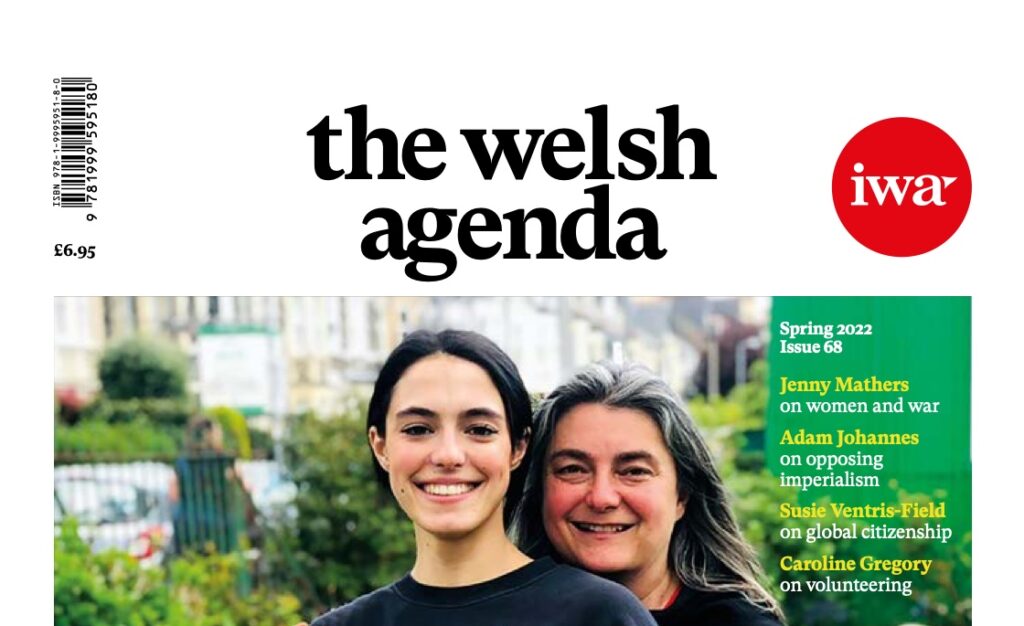Marine Furet introduces issue 68 of the welsh agenda and reflects on the role of magazines to provide lasting content amid a fast news cycle.
Remember those videos of Mick Lynch ‘bodying’ journalists on national television filling up your timeline a few days ago?
It seems that last week all you had to do was open your browser to be bombarded with stories about the ongoing industrial action led by RMT and its charismatic, media-ready leader. We even ran a story about it. Today though, you’d be hard-pressed to find a headline about the strike. Rwanda. Roe V. Wade. Christopher Kapessa. The Kremenchuck bombing. Everyday very real human stories compete for our attention in an ever-expanding, ever-growing ‘information market’. the welsh agenda is just one among a myriad of outlets you can choose from and select as your window onto the world.
At best, to choose the news you read can become a compensatory act when all else fails, a way to cultivate some sense of agency and direction in the newstorm.
The call on readers to make a choice as consumers of journalistic content and as citizens is ever pressing and, frankly, anxiety-inducing, each choice heavy with political and ethical consequences, or so it may seem when looking at news at consumer-level. I am not sure that good stories always do change the world, but their ability to make a material impact in our day to day life is undeniable.
At best, to choose the news you read can become a compensatory act when all else fails, a way to cultivate some sense of agency and direction in the newstorm. At worst, it can become an exercise in cynicism, a game of choose-your-own-disaster, or a hellish trip down a red-pilled rabbit hole. If it sometimes appears that the impact of the latter makes the headlines a lot more, it may be because, as our editorial board member Grace Quantock recently noted in relation to climate activism (citing Rebecca Solnit), news stories tend to have a negative bias: ‘If some past victories are hard to see, it’s because there’s nothing left behind to see’. Catastrophes make good stories. Strife is easier to document. Optimism, by contrast, is always a discipline.
Discussions and debates that drive Wales forward.
Join Wales’ leading independent think tank.
When the war in Ukraine began, as we were settling on the contents of our next issue of the welsh agenda, we had to make our own decisions about what we thought would be ‘newsworthy’, what our readers would like to learn about, from a Welsh perspective, and what they would be likely to find worthwhile reading a few months later. Two months after publication, it is depressing to think that what our contributors wrote about Ukraine has become more important, not less, even as the sounds of bombardments have receded into a background hum in newsrooms around the world. This is a self-serving argument if ever there was one, but if there’s anything the ‘slower news’ publication cycle of a magazine enables, it’s perhaps that the texts that we publish are here to stay, at least until the next issue comes out in October. Until then, you have a summer to delve into some of the considered, thoughtful journalism that we are making available for you in our latest edition.
Ukraine features front and centre. Adam Johannes’ call for peace has yet to be heeded, and remains, tragically, relevant. Susie Ventris-Field’s article explores the potential and contradictions of the position of global citizens faced with military conflicts. Jenny Mathers examines the gendered impact of the war.
Several writers also offer insights into the stories that get told and the stories we forget. The longest read in this edition is dedicated to Welsh writer Jan Morris, and her lifelong effort at self-fashioning an identity amid the challenges surrounding coming out as a trans woman – now and before. Grace Quantock’s piece on representation in nature writing, previously published online, is also included in this edition.
The cost of living crisis also continues, ever more acute,, and we are delighted to include incisive writing from Polly Manning, Jean Jenkins, Shavanah Taj, Nisreen Mansour and Joe Allen on workers’ rights and living conditions in times of austerity.
Finally, we are proud that 2022 was a good year for bringing community rights to the fore of public discourse and awareness in Wales. Almost six months after the release of Harry Thompson’s foundational report Our Land: Communities and Land Use, lines are shifting in Wales to allow residents more of a say in the sale and management of public assets. This issue of the welsh agenda is packed full with some of the best writing we’ve gathered on the importance of public conversations about land and access. We hope you enjoy it!
You can buy the latest issue of the welsh agenda in print or as a pdf here.





